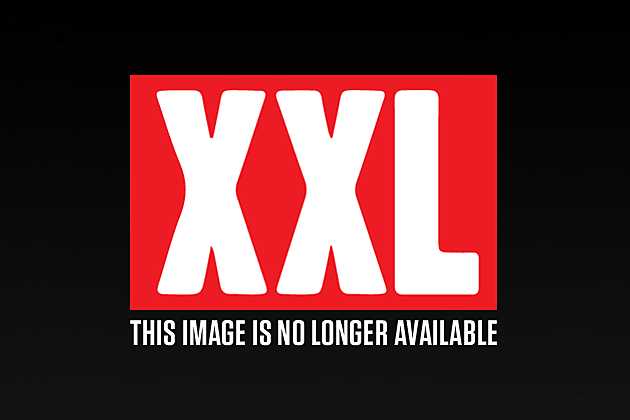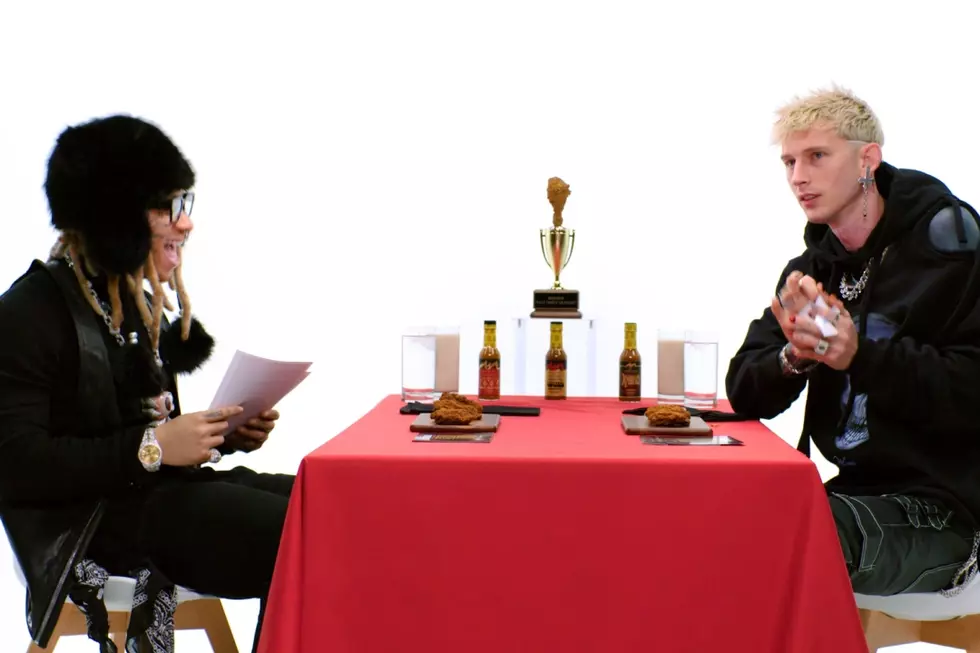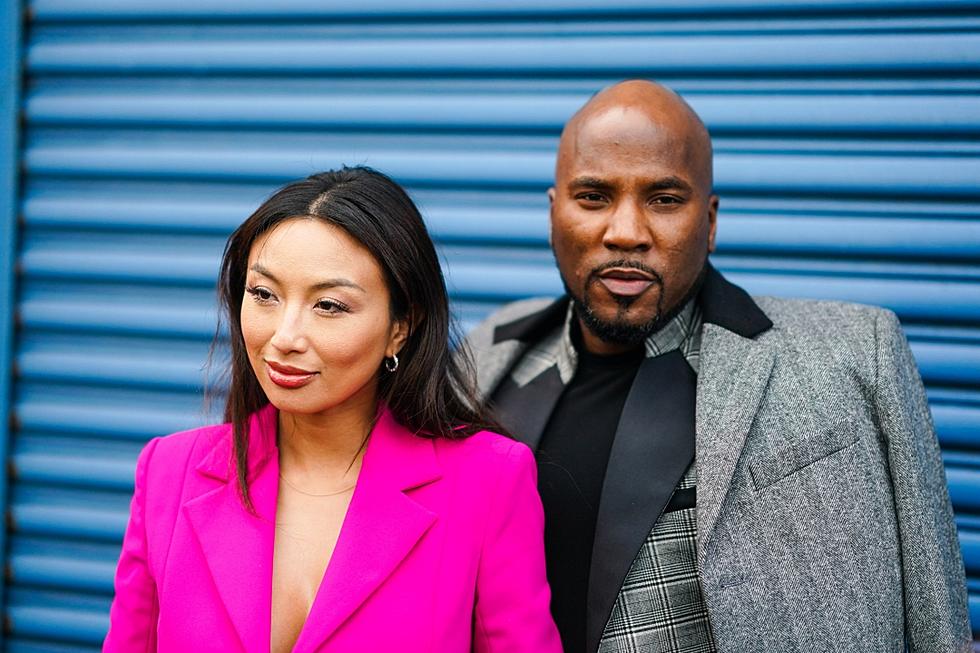DJ Babu
The Perfect Beat
 Getting DJ Babu to stop talking is a chore in itself. Verbosity, though, isn’t usually associated with the acclaimed turntablist. In fact, unless you’re a zealous Dilated Peoples fan, you’ve probably never heard Babu utter a single word. Today, however, is different as the man of few words is chatting a mile a minute. Sitting in his home studio with veteran Cali MC, Defari (the two make up the group Likwit Junkies), Chris “DJ Babu” Oroc is the happiest he’s ever been, and for good reason. Last month, he released The Beat Tape, Vol. 1, a 25-track instrumental LP on Nature Sounds Records. He’s also working on Vol. 3 of his celebrated Duck Season compilation series, as well as a sophomore release from the Likwit Junkies. Clearly, the Filipino-American DJ has kept himself busy ever since Dilated Peoples, a West Coast-based group comprised of Babu and rappers Evidence and Rakka Iriscience, fulfilled their contract obligations to their longtime home, Capitol Records. During their six-year run with the major, the trio released four notable LPs, but like most underground crews, they were never able to reap any mainstream success. Their closest shot at a national hit came courtesy of the Kanye West-assisted “My Way” off their third album, Neighborhood Watch. The 2004 single rose as high as No. 22 on the Billboard Hot Rap chart, but without a follow up single or video the album stalled out at just under 150,000 units. Undeterred, the Cali collective is returning to their indie roots, focusing on solo projects before reuniting in 2008 for the next Dilated album. XXLMag.com spoke with DJ Babu about Dilated’s rollercoaster career, the pitfalls of being on a major label and his new instrumental album, The Beat Tape, Vol. 1.
Getting DJ Babu to stop talking is a chore in itself. Verbosity, though, isn’t usually associated with the acclaimed turntablist. In fact, unless you’re a zealous Dilated Peoples fan, you’ve probably never heard Babu utter a single word. Today, however, is different as the man of few words is chatting a mile a minute. Sitting in his home studio with veteran Cali MC, Defari (the two make up the group Likwit Junkies), Chris “DJ Babu” Oroc is the happiest he’s ever been, and for good reason. Last month, he released The Beat Tape, Vol. 1, a 25-track instrumental LP on Nature Sounds Records. He’s also working on Vol. 3 of his celebrated Duck Season compilation series, as well as a sophomore release from the Likwit Junkies. Clearly, the Filipino-American DJ has kept himself busy ever since Dilated Peoples, a West Coast-based group comprised of Babu and rappers Evidence and Rakka Iriscience, fulfilled their contract obligations to their longtime home, Capitol Records. During their six-year run with the major, the trio released four notable LPs, but like most underground crews, they were never able to reap any mainstream success. Their closest shot at a national hit came courtesy of the Kanye West-assisted “My Way” off their third album, Neighborhood Watch. The 2004 single rose as high as No. 22 on the Billboard Hot Rap chart, but without a follow up single or video the album stalled out at just under 150,000 units. Undeterred, the Cali collective is returning to their indie roots, focusing on solo projects before reuniting in 2008 for the next Dilated album. XXLMag.com spoke with DJ Babu about Dilated’s rollercoaster career, the pitfalls of being on a major label and his new instrumental album, The Beat Tape, Vol. 1.
Why did you decide to do this instrumental album, The Beat Tape, Vol. 1?
Most people know me from being nice on the decks—the DMC [DJ] battles, DJ videos—but it’s been a long transition to let fools know I do these beats, too. I thought it would be nice to put out an instrumental album that showed my producer side. This Beat Tape is just raw beats I would hand off to MCs. This was a combination of current joints and a few that [were] collecting dust. I wanted it to be a way to show people what I was doing in the lab. The producer world is a highly competitive field. It’s hard to break in and get your beat placed on a project. I’ve been blessed to have my own groups throughout the years, whether it’s Dilated Peoples or Likwit Junkies. But still, for me to place a beat on a Jay-Z or Ghostface record is hard work. I just look at this Beat Tape as a calling card for me. A lot of the joints on here are becoming joints for people’s albums. I wanted it to be something for MCs to listen to and maybe become a bridge for me to get more work. I [also] wanted to make it a nice listening experience that you can put in the car.
One track on the album is called “Help,” where you twist a vocal sample in a real creative way. How did you come up with that technique?
I got that idea from DJing. That’s a song I love to play during a club set. That’s a part of the record I like to catch doubles on [repeating one part of a song—usually the break beat—by using the same record on each turntable]. One day, I was at the club and I caught that groove and I was like, “That would be a hot ass beat.” So I took the beat, time stretched it to get more of the tempo I wanted, chopped it the fuck up and took the bits I liked. I took little parts with the guitar, took the little turnaround and just built up off that loop. I would love to hear someone with a raw voice on that. I can’t front, [though], that was totally a J Dilla inspired style. I’ve always dug his beat tapes, hearing him chop little notes and turning things you wouldn’t think of into new grooves. I definitely took a page out of his book.
Switching gears to Dilated Peoples, what went wrong with your situation at Capitol Records?
There was a bunch of things. While we were there, we saw the whole regime change three times—presidents changing, whole departments fired. We had maybe five people who were in the building as long as we were. They did what they could, but at the end of the day, it was a matter of them getting caught up in the hype of trying to compete. We signed at a time when they didn’t even have a rap or urban department. We came in and set up the urban department for them. Years later, they merged with Priority. They were a heavyweight hip-hop label and they didn’t feel responsible for us. Ron Lafitte was our A&R. He had a lot of pull in the building, but not really in the hip-hop world. He came from signing [rock group] Jane’s Addiction and managing Megadeth. He saw us rock at The Roxy [Theatre], selling out two nights in a row as an independent group and signed us off the strength of that, selling 12-inches and touring around the world. He knew something was there, [but] he didn’t understand the urban market.
Based on that lack of hip-hop understanding over there, was the relationship pretty much doomed from the beginning?
We got put into the machine, but it was beautiful, man. We were able to play on stages I never imagined. We got to be on the radio and TV in ways I never imagined. But at the same time, there is that constant pressure of them wanting you to succeed and them just seeing success in terms of [numbers]. We had three albums where they didn’t give us a look at a second single or video. I thought that was a big factor every time. It compiled pressure and gave us so much bitterness towards the label. I always thought we met them halfway while staying true to ourselves. We weren’t being ignorant that we were on a major label competing with the likes of Chingy. But it was a beautiful learning experience and it elevated our music to another level that will go down in the history books. We were able to do a lot in a time when the rap game was real funny. We were out there like the last of a dying breed, holding it down. But the future is still bright, being back independent.
Was it pressure from the label that had y’all collaborate with Kanye West for your 2004 single, “This Way?”
We had all this Kanye West success [but] we had shaken our core fan base. We knew it didn’t feel right, just the way the Neighborhood Watch album was promoted. So Rakka just said, “Fuck it, we need to get back together. We gotta get another album together and correct our legacy.” So we banged out 20/20 [in 2006] and it received the best reviews we’ve gotten since [our second album] Expansion Team. Thankfully, me and Rakka are better friends than ever after all the shit we went through. Cats always loved each other, but I don’t know if we always liked each other at certain times during our stint at Capitol.
Was there ever a time when the group was close to breaking up?
20/20 wasn’t even supposed to happen, to be real with you. That pressure of being signed to a major label does things to a group. Rakka made the call [to Evidence and me] while we were on our indefinite break. We were kinda confused. Ev had just lost his mom, I was having my second kid, shit [was going on] with the label—it was a real crazy time.
How does it feel to be independent artists again?
It’s a new day and I’m happy we’re out on our own. We’re back to managing ourselves. We run our own studio, Rakka books our tours, we run our websites, we answer our own fan mail… it’s back to us doing everything. It feels so liberating. It’s a new day and age for Dilated. So I don’t want anybody to [think] we’re breaking up. Dilated is here. It’s more than a group; it’s a movement. I’d love to say you’ll see Dilated having a steady gig in Vegas 20 years from now, doing the hip-hop classics. [Laughs]
Check out some tracks from Beat Tape Vol. 1 below.
"Veetee"
"Round and Round"
"Rochchuuch"
"Pil 1"
"Why Fair"
"Dee On"
More From XXL








